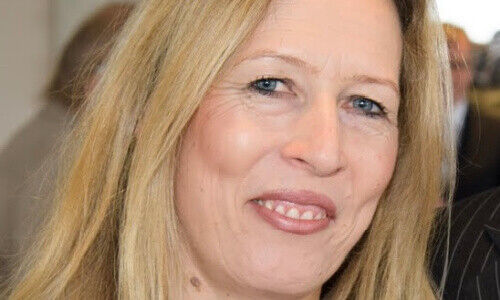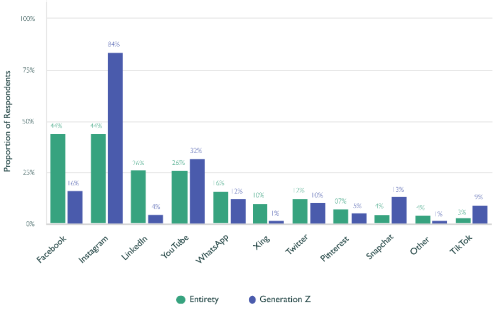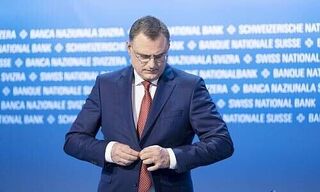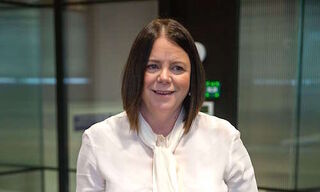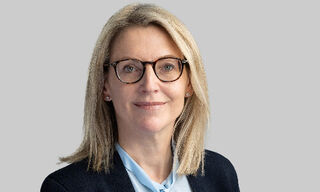Why is the financial industry having such a hard time utilizing new digital channels? In an essay on finews.first, Birte Orth-Freese provides some explanations.
This article is published on finews.first, a forum for authors specialized in economic and financial topics.
Exactly 71 percent of Swiss use social media channels in Switzerland, according to a survey by Xeit 2020. Ten years ago, just one in two Swiss citizens were active on social media channels. However, if you look a little closer, there is a big gap between Generation Z and the «average population».
Instagram, for example, is ahead of all other channels with 84 percent among today's 21- to 34-year-olds. But even the «aggregate» uses this channel at least half the time. Facebook is holding its own with mid-agers but has declining numbers in Europe. LinkedIn, on the other hand, is used more by professionals; here, the younger ones apparently network later, because the growth rate is high (see graphic below).
(Click to enlarge)
The figures clearly show that: There is no such thing as an undifferentiated approach to social media; here, too, content and formats have to be age-appropriate. This does not mean, however, that a private bank, for example, should not use both Instagram and TikTok in addition to LinkedIn, YouTube, and possibly Twitter.
After all, it is still true for brands that they should become a part of people's lives at an early stage and provide sufficient touchpoints. Once they are established, few consumers change their minds because they either shy away from the effort or feel an attachment to the brand.
«The correct company account UBS is not found at all»
So why is it that digital channels for brand awareness or as a sales channel have been used so little in some cases? While companies often have a communications strategy, social media is often a blank slate. One or two channels are operated by the communications department. But why is this sometimes done so half-heartedly? The rules of the game seem different.
The fear of not being able to control the channels is great, more risks are perceived than opportunities. Even important details are sometimes not considered. How else can it be explained that – if you enter #UBS Switzerland on Instagram – exactly three posts appear. Because the correct company account UBS is not found at all, since it apparently did not take this hashtag into consideration.
«Editorial planning also seems to have room to improve»
If you look at Credit Suisse's Instagram account, you'll find 301 posts and just fewer than 10,000 subscribers. The fact that they have been on Instagram since June 2018 and are presenting just 100 posts per year to their community, and almost exclusively in the sports sector, shows there is still room for improvement. Editorial planning also seems to have room to improve. After the post on April 15 of this year, it took almost six weeks for the next one to be published.
The leaders in this field are – not surprisingly – rather the neobanks. With over 100,000 subscribers, the direct bank N26 is leading the way on Instagram. Whether the posts have struck a chord with users is shown, for example, by the number of interactions. But a few large Swiss private banks are also quite far advanced in their digital activities, especially when it comes to the trendy topic of sustainability.
«Trainees are part of the editorial team – young people strike a chord with their generation»
What about the new channel TikTok? Here, too, many financial institutions don't really dare to do anything. It's nice to have the icon on flyers or the website – but the accounts are usually not being used. A positive example from Germany is the Sparkasse Düsseldorf with 169,300 followers. Their secret: content with curious news from around the world, presented as a news video and at the same time addressing questions like «How much do you actually earn in Germany?» and «3 tips to save money while shopping at the supermarket». Trainees are part of the editorial team – young people strike a chord with their generation.
Social media channels should no longer be neglected in the financial industry. The potential is too great. Of course, compliance should not be underestimated in this context, but it is important to overcome this obstacle. It also takes courage and creativity to think up and implement unusual stories. Above all, this goes beyond the company's own internal topics (sponsoring, anniversary, success stories). It is certainly also essential for the management team to be part of the community and not just to set targets!
Birte Orth-Freese joined communications agency TE Communications three years ago, initially as Managing Director; since April 2020, she has been CEO of the company, which is based in Frankfurt am Main and St. Gallen. Prior to that, she worked in various roles in consulting. Between 1985 and 1995, she studied journalism and communication science as well as German and political science at the Westphalian Wilhelms University in Münster, at Lueger University in Vienna and at Gutenberg University in Mainz. She graduated as «Magisterin Artium».
Previous contributions: Rudi Bogni, Peter Kurer, Rolf Banz, Dieter Ruloff, Werner Vogt, Walter Wittmann, Alfred Mettler, Robert Holzach, Craig Murray, David Zollinger, Arthur Bolliger, Beat Kappeler, Chris Rowe, Stefan Gerlach, Marc Lussy, Nuno Fernandes, Richard Egger, Maurice Pedergnana, Marco Bargel, Steve Hanke, Urs Schoettli, Ursula Finsterwald, Stefan Kreuzkamp, Oliver Bussmann, Michael Benz, Albert Steck, Martin Dahinden, Thomas Fedier, Alfred Mettler, Brigitte Strebel, Mirjam Staub-Bisang, Nicolas Roth, Thorsten Polleit, Kim Iskyan, Stephen Dover, Denise Kenyon-Rouvinez, Christian Dreyer, Kinan Khadam-Al-Jame, Robert Hemmi, Anton Affentranger, Yves Mirabaud, Katharina Bart, Frédéric Papp, Hans-Martin Kraus, Gerard Guerdat, Mario Bassi, Stephen Thariyan, Dan Steinbock, Rino Borini, Bert Flossbach, Michael Hasenstab, Guido Schilling, Werner E. Rutsch, Dorte Bech Vizard, Adriano B. Lucatelli, Katharina Bart, Maya Bhandari, Jean Tirole, Hans Jakob Roth, Marco Martinelli, Thomas Sutter, Tom King, Werner Peyer, Thomas Kupfer, Peter Kurer, Arturo Bris, Frederic Papp, James Syme, Dennis Larsen, Bernd Kramer, Ralph Ebert, Armin Jans, Nicolas Roth, Hans Ulrich Jost, Patrick Hunger, Fabrizio Quirighetti, Claire Shaw, Peter Fanconi, Alex Wolf, Dan Steinbock, Patrick Scheurle, Sandro Occhilupo, Will Ballard, Nicholas Yeo, Claude-Alain Margelisch, Jean-François Hirschel, Jens Pongratz, Samuel Gerber, Philipp Weckherlin, Anne Richards, Antoni Trenchev, Benoit Barbereau, Pascal R. Bersier, Shaul Lifshitz, Klaus Breiner, Ana Botín, Martin Gilbert, Jesper Koll, Ingo Rauser, Carlo Capaul, Claude Baumann, Markus Winkler, Konrad Hummler, Thomas Steinemann, Christina Boeck, Guillaume Compeyron, Miro Zivkovic, Alexander F. Wagner, Eric Heymann, Christoph Sax, Felix Brem, Jochen Moebert, Jacques-Aurélien Marcireau, Ursula Finsterwald, Claudia Kraaz, Michel Longhini, Stefan Blum, Zsolt Kohalmi, Karin M. Klossek, Nicolas Ramelet, Søren Bjønness, Lamara von Albertini, Andreas Britt, Gilles Prince, Darren Willams, Salman Ahmed, Stephane Monier, and Peter van der Welle, Ken Orchard, Christian Gast, Jeffrey Bohn, Juergen Braunstein, Jeff Voegeli, Fiona Frick, Stefan Schneider, Matthias Hunn, Andreas Vetsch, Fabiana Fedeli, Marionna Wegenstein, Kim Fournais, Carole Millet, Ralph Ebert, Swetha Ramachandran, Brigitte Kaps, Thomas Stucki, Neil Shearing, Claude Baumann, Tom Naratil, Oliver Berger, Robert Sharps, Tobias Mueller, Florian Wicki, Jean Keller, Niels Lan Doky, Karin M. Klossek, Ralph Ebert, Johnny El Hachem, Judith Basad, Katharina Bart, Thorsten Polleit, Bernardo Brunschwiler, Peter Schmid, Karam Hinduja, Zsolt Kohalmi, Raphaël Surber, Santosh Brivio, Gérard Piasko, Mark Urquhart, Olivier Kessler, Bruno Capone, Peter Hody, Lars Jaeger, Andrew Isbester, Florin Baeriswyl, and Michael Bornhaeusser, Agnieszka Walorska, Thomas Mueller, Ebrahim Attarzadeh, Marcel Hostettler, Hui Zhang, Michael Bornhaeusser, Reto Jauch, Angela Agostini, Guy de Blonay, Tatjana Greil Castro, Jean-Baptiste Berthon, Marc Saint John Webb, Dietrich Goenemeyer, Mobeen Tahir, Didier Saint-Georges, Serge Tabachnik, Rolando Grandi, Vega Ibanez, Beat Wittmann, David Folkerts-Landau, Andreas Ita, Teodoro Cocca, Michael Welti, Mihkel Vitsur, Fabrizio Pagani, Roman Balzan, Todd Saligman, Christian Kaelin, Stuart Dunbar, Fernando Fernández, Lars Jaeger, and Carina Schaurte.

